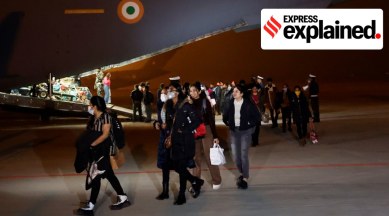Kaunain Sheriff M is an award-winning investigative journalist and the National Health Editor at The Indian Express. He is the author of Johnson & Johnson Files: The Indian Secrets of a Global Giant, an investigation into one of the world’s most powerful pharmaceutical companies. With over a decade of experience, Kaunain brings deep expertise in three areas of investigative journalism: law, health, and data. He currently leads The Indian Express newsroom’s in-depth coverage of health. His work has earned some of the most prestigious honours in journalism, including the Ramnath Goenka Award for Excellence in Journalism, the Society of Publishers in Asia (SOPA) Award, and the Mumbai Press Club’s Red Ink Award. Kaunain has also collaborated on major global investigations. He was part of the Implant Files project with the International Consortium of Investigative Journalists (ICIJ), which exposed malpractices in the medical device industry across the world. He also contributed to an international investigation that uncovered how a Chinese big-data firm was monitoring thousands of prominent Indian individuals and institutions in real time. Over the years, he has reported on several high-profile criminal trials, including the Hashimpura massacre, the 2G spectrum scam, and the coal block allocation case. Within The Indian Express, he has been honoured three times with the Indian Express Excellence Award for his investigations—on the anti-Sikh riots, the Vyapam exam scam, and the abuse of the National Security Act in Uttar Pradesh. ... Read More
Explained: Why Govt has allowed foreign medical students to complete internships in India, who can apply
The National Medical Commission has allowed foreign medical students who have returned from war-torn Ukraine to complete their internships in India. Who can apply? Is there a quota? Will students have to pay additional fees? Will a stipend be given?

The National Medical Commission (NMC) has made a significant relaxation for students who are unable to complete their MBBS internships because of compelling situations like the Ukraine war or the Covid-19 pandemic. It has said foreign medical graduates can apply to complete their internships in India.
The change is likely to provide some relief for final year medical students returning from Ukraine, and several students who are not able to complete their internships in China due to Covid-19 restrictions that continue to be imposed in the country.
monthly limit of free stories.
with an Express account.
🗞️ Subscribe Now: Get Express Premium to access the best Election reporting and analysis 🗞️
What has changed now?
Currently, Indian regulations do not allow foreign medical graduates to transfer to an Indian medical college for internships or examinations. The regulations strictly state that the MBBS course, training, and internship should be done in the same foreign medical institution.
For instance, the MBBS course in Ukraine is five and half years. The regulation stipulates that students have to complete a 12-month internship in Ukraine.
Now, however, the NMC has made one relaxation related to internships. The regulator has said that foreign medical graduates with incomplete internships due to the war can apply to complete the remaining part of the internship in India.
Can any foreign medical student apply in India?
No. The NMC has said state medical councils have to ensure the candidates applying for completion of internship in India must have cleared the Foreign Medical Graduates Examination (FMGE) — a licensure examination conducted by the National Board of Examinations in India.
This means, state medical councils can process the applications of students who want to complete their internships in India only after they clear the FMGE.
What other guidelines do state medical councils have to follow?
First, state medical councils have to ensure the medical degree can be used to practice medicine in the jurisdiction of the country in which the MBBS degree was awarded, and is at par with the license to practice medicine given to a citizen of that country.
Second, state medical councils should ensure the student has documentary evidence certifying successful completion of physical training or internship during MBBS.
Third, the FMGE conducted by the National Board of Examination should be cleared by the candidate. “If the candidate is found fulfilling all the above-mentioned criteria, provisional registration may be granted by State Medical Councils for 12 month internship or balance period, as the case may be,” the NMC has said.
Has the NMC fixed a quota for allocation of internships?
Yes. The NMC has said the maximum quota for allocation of internships to foreign medical graduates must be restricted to the additional 7.5 per cent of total permitted seats in a medical college. And, internships will be allowed only in the medical colleges that are permitted by the NMC.
Newsletter | Click to get the day’s best explainers in your inbox
Will foreign medical graduates have to pay additional fees?
No. The NMC has said the state medical councils should obtain an undertaking from the medical college that no amount or fee is charged from the students for the internships.
Will a stipend be given to the students?
Yes. The NMC has said a stipend and other facilities, equivalent to what is provided to Indian medical graduates being trained at government colleges, should be extended to foreign medical graduates.